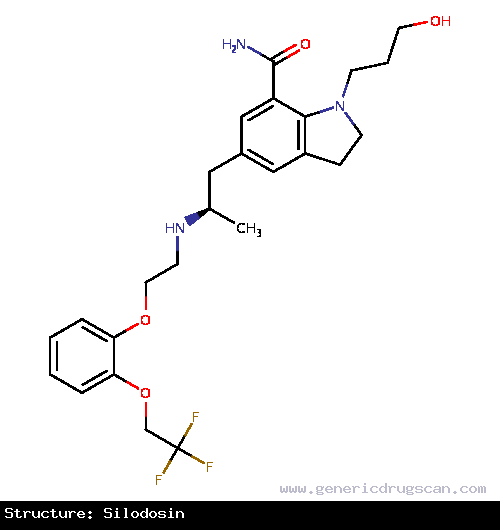Silodosin Drug: Indication, Dosage, Precaution, Side Effect , Storage, Category Type and corresponding Brands - www.genericdrugscan.com
Silodosin
Drug Status in USA : ApprovedDrug Status in Canada : Approved
pronunciation
pronounced as (sye'' lo doe' sin)
Why is this medication prescribed?
Silodosin is used in men to treat the symptoms of an enlarged prostate (benign prostatic hyperplasia; BPH), which include difficulty urinating (hesitation, dribbling, weak stream, and incomplete bladder emptying), painful urination, and urinary frequency and urgency. Silodosin is in a class of medications called alpha-blockers. It relieves the symptoms of BPH by relaxing the muscles of the bladder and prostate.
How should this medicine be used?
Silodosin comes as a capsule to take by mouth. It is usually taken with food once a day. Do not take silodosin on an empty stomach. Take silodosin at around the same time every day. Follow the directions on your prescription label carefully, and ask your doctor or pharmacist to explain any part you do not understand. Take silodosin exactly as directed. Do not take more or less of it or take it more often than prescribed by your doctor.
Silodosin controls the symptoms of BPH but does not cure it. Continue to take silodosin even if you feel well. Do not stop taking silodosin without talking to your doctor.
What are the precautions to be followed?
Before taking silodosin,- tell your doctor and pharmacist if you are allergic to silodosin or any other medications.
- tell your doctor if you are taking antifungals such as ketoconazole (Nizoral) and itraconazole (Sporanox); clarithromycin (Biaxin, in Prevpac); HIV protease inhibitors such as indinavir (Crixivan), nelfinavir (Viracept), ritonavir (Norvir, in Kaletra), and saquinavir (Fortovase); nefazodone; telithromycin (Ketek). Your doctor will probably tell you not to take silodosin.
- tell your doctor and pharmacist what other prescription and nonprescription medications, vitamins, nutritional supplements, and herbal products you are taking or plan to take. Be sure to mention any of the following: cyclosporine (Neoral, Sandimmune); diltiazem (Cardizem, Dilacor, Tiazac); erythromycin (E.E.S., E-Mycin, Erythrocin); fluconazole (Diflucan); medications for high blood pressure;other alpha blockers such as doxazosin (Cardura), prazosin (Minipress), terazosin (Hytrin), and tamsulosin (Flomax); and verapamil (Calan, Covera, Isoptin, Verelan). Your doctor may need to change the doses of your medications or monitor you carefully for side effects. Many other medications may also interact with silodosin, so be sure to tell your doctor about all the medications you are taking, even those that do not appear on this list.
- tell your doctor if you have kidney or liver disease. Your doctor will probably tell you not to take silodosin.
- tell your doctor if you have or have ever had low blood pressure.
- you should know that silodosin is only for use in men. Women should not take silodosin, especially if they are or could become pregnant or are breast-feeding. If a pregnant woman takes silodosin, she should call her doctor.
- if you are having surgery, including dental surgery, tell the doctor or dentist that you are taking silodosin. If you need to have eye surgery at any time during or after your treatment, be sure to tell your doctor that you are taking or have taken silodosin.
- you should know that silodosin may make you drowsy or dizzy, especially when you first start taking it. Do not drive a car or operate machinery until you know how this medication affects you.
- you should know that silodosin may cause dizziness, lightheadedness, and fainting when you get up too quickly from a lying position. This is more common when you first start taking silodosin. To avoid this problem, get out of bed slowly, resting your feet on the floor for a few minutes before standing up. If you experience these symptoms, sit or lie down. If these symptoms do not improve, call your doctor.
What are possible side effects of this medication ?
Silodosin may cause side effects. Tell your doctor if any of these symptoms are severe or do not go away:- orgasm with little or no semen (fluid)
- diarrhea
- dizziness
- low blood pressure
- stuffy or runny nose
- painful erection of the penis that lasts for several hours
Silodosin may cause other side effects. Call your doctor if you have any unusual problems while taking this medication.
How to store the medication and dispose it of after its use later?
Keep this medication in the container it came in, tightly closed, and out of reach of children. Store it at room temperature and away from excess heat and moisture (not in the bathroom). Throw away any medication that is outdated or no longer needed. Talk to your pharmacist about the proper disposal of your medication.
Drug Category/Class
- Adrenergic alpha-1 Receptor Antagonists
- Drugs Used in Benign Prostatic Hypertrophy
- Genito Urinary System and Sex Hormones
- CYP3A4 Inhibitors
- Adrenergic alpha-Antagonists
- Urological Agents
- Alpha-adrenoreceptor antagonists
| Prescribed | Treatment for symptomatic relief of benign prostatic hyperplasia |
| Weight : | 495.5345 |
| Structure | Silodosin |
 | |
| Formula | C25H32F3N3O4 |
Silodosin has 5 Brands listed
| Rapilif (4 mg) | Rapilif (8 mg) |
| Silodal (4 mg) | Silodal (8 mg) |
| Silofast (8 mg) |
Search Generic Drugs alphabetically
